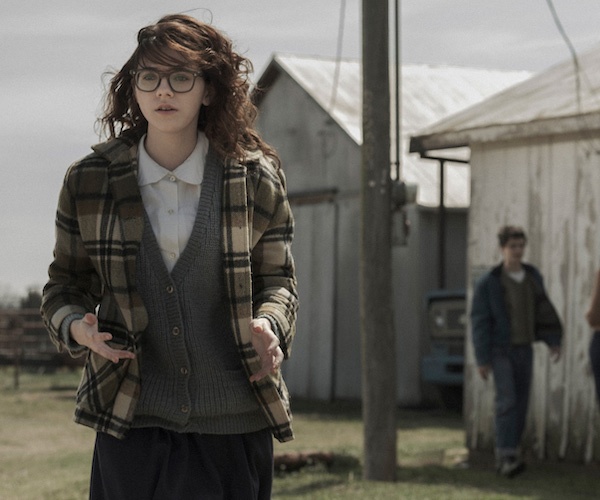Film Review: “To the Stars” — Girls Have It Tough
By Peg Aloi
To the Stars is a somewhat formulaic Middle America melodrama, enlivened by inspired and well-directed performances that infuse some radiant life into small-town struggles.
To the Stars, directed by Martha Stephens. Amazon Prime

Kara Hayward as Iris Deerborne in a scene from To the Stars.
People often say that teenage girls have it twice as hard growing up as their male counterparts. Perhaps it’s because girls bond deeply but can also betray each other on a whim. I’ve been glad to see a wider social acceptance of gender diversity and expression in recent years. Adolescence is a hard enough time without imposing strict and outdated conventions on maturing young adults. To the Stars, directed by Martha Stephens (Land Ho!, co-directed with Aaron Katz), takes place in the 1960s in Oklahoma, when accepted gender norms were just beginning to be seriously examined and unraveled.
In the first scene we see protagonist Iris Deerborne running across a field at night and then swimming under starlight in a lake. She floats on her back in a billowing white nightgown, her heavy rimmed plastic eyeglasses sitting behind on the shore. Played by Kara Hayward (Moonrise Kingdom), Iris is shy and seems more than a little timid. But that’s because she lives in fear of being teased and shamed by her classmates and also, to some extent, by her mother Francie (Ozark’s Jordana Spiro). Mom was a sought-after beauty as a teenager and, though her beauty has barely faded, she has become restless and bored. She tends to drink too much. She berates her husband Hank (Fargo’s Shea Whigham) for not paying her enough attention. He’s a quiet man who dotes on his daughter and hopes she’ll grow out of her mousy phase.
An underlying health problem complicates Iris’s embarrassment at school; any of us who survived being a teenager can attest to those school days that seemed endless, irrevocable, and consequential. She secretly watches the local boy who does chores on her family’s farm; she sees that he has his own demons he’s struggling with. The Oklahoma town seems beset with sadness and cruel gossip.
Walking to school one day on a deserted stretch of road, Iris is set upon by three local youths in a pickup truck who tease her, knock her books out of her hands, make rude comments about her body, and try to assault her. A late-model butter yellow station wagon rolls up and a teenage girl yells at the boys to leave Iris alone. She proceeds to throw rocks at them. After being cursed at and then threatened by this firebrand, the boys back down and drive away. Iris is grateful to her savior but remains wary.
The do-gooder turns out to be the new girl in school, Maggie Richmond (Liana Liberato). The popular kids who cruelly tease and shun Iris are attracted to Maggie’s easy confidence and fashionable big city allure. Maggie says her family moved to the town from Kansas City because her father is a photographer on assignment for Life magazine. She wins people over with her glamour and plays the popularity game. Still, she shows kindness to Iris in public and privately seeks her out. The two become friends and share their secrets, which are rooted in a fear of exposure and shame. Iris learns to appreciate her own beauty under Maggie’s sophisticated guidance, but adolescence in this pedestrian town is stuck in a sexual proving ground of prom dates and peer pressures. We find out Maggie’s family moved because of a scandal that embarrassed her family. Her stern father (Arrested Development’s Tony Hale) is determined to keep his daughter’s rebellious behavior in check. This small town is steeped in sexism and small-minded moralism: Maggie does her best to stay out of trouble, but she is angry about having to curb her nature.
This coming-of-age story, written by first-timer Shannon Bradley-Colleary, is a fairly competent feature, though occasionally major plot events take place off-screen, which is frustrating. Some of the story turns out to be predictable and gimmicky; the action isn’t always character-driven, and that is a shame because the characters are so well acted. Cast members are excellent across the board, especially Hayward, who crafts a compelling portrayal of a young woman who knows her worth and is desperate for a real friend. Liberato’s performance is nuanced and alluring. The settings, props, and costumes are period perfect, and I liked the rich score by Heather McIntosh (known for Compliance and The Art of Self-Defense) though, for my taste, the music starts out a bit too chipper. To the Stars is a somewhat formulaic Middle America melodrama, enlivened by inspired and well-directed performances that infuse some radiant life into small-town struggles.
Peg Aloi is a former film critic for the Boston Phoenix and member of the Boston Society of Film Critics. She taught film studies in Boston for over a decade. She writes on film, TV, and culture for web publications like Vice, Polygon, Bustle, Mic, Orlando Weekly, Crooked Marquee, and Bloody Disgusting. Her blog “The Witching Hour” can be found at themediawitch.com.

